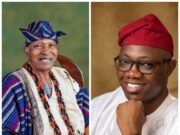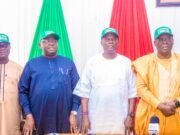State governors are gradually settling down after their inauguration on May 29. They have made a number of key appointments as evidence that they have hit the ground running in their respective domains. However, they are appointments that fall within the ambit of their executive powers, as quite a preponderance of pending major appointments require legislative approval. Such approval is not necessarily predicated on the provisions of the constitution, but also on serious political engineering and lobbying.
Accordingly, state chief executives often show more than a passing interest in the process of power sharing in the legislature. Even where a governor and majority of the members of the legislative arm are elected on the platform of the same political party, the issue of power sharing remains touchy, largely because of the role of power centres that are diametrically opposed in intent and direction. The politics of power sharing becomes more intense, where a coalition of forces railroaded victory at the general election such as was witnessed in a number of states in the 2019 governorship polls. Some state Houses of Assembly are battling with such scenario after their inauguration. Where a speaker may have emerged, there is a problem over the sharing formula over other levels towards averting conflict of interests. Reports indicated the mutual agreement on power sharing among the coalition of parties that worked to guarantee success at the poll have either been jettisoned by the senior partner in the arrangement or enmeshed in controversy.
What the opposition parties in Oyo State could not achieve in the 2015 election, when they attempted to stop the All Progressives Congress (APC) governor, Senator Abiola Ajimobi, from getting a second term, was almost seamlessly realised in the 2019 elections.
In the first round of elections, the APC won two Senate seats and nine out of 14 House of Representatives positions. From the results, it was clear to the opposition parties that history would repeat itself, if they did not fuse to dislodge the APC.
A series of meetings, accompanied by high-wired horse trading were quickly held among leaders and governorship candidates of the Peoples Democratic Party (PDP), Seyi Makinde; African Democratic Congress (ADC), Senator Femi Lanlehin; Zenith Labour Party (ZLP), Chief Sharafadeen Alli; and Social Democratic Party (SDP), Chief Bolaji Ayorinde, SAN.
Makinde, the PDP candidate, was consequently unanimously adopted as the coalition governorship candidate. Lanlehin, Alli and Ayorinde not only stepped down for him, all the state House of Assembly candidates of ADC, which has 12 serving lawmakers, lost their election principally as a result of the coalition.
Despite the loss of the Assembly candidates, the opposition leaders held their head high up that they succeeded in stopping Ajimobi from succeeding himself. The coalition was not achieved without an agreement as to how the ‘spoils of war’ would be shared.
Based on the result of the February 23 election, which they reckoned showed the strength of coalescing parties individually, it was agreed that PDP would get 65 per cent, ADC 30, ZLP 5 and SDP, 0.05 per cent. Governor Makinde, it was gathered, magnanimously added 10 per cent to the five allotted ZLP, out of deference for Senator Rashidi Ladoja, who coordinated the coalition.
Feelers from the coalition partners suggest that Makinde is committed to honouring terms.
Though some political stakeholders, it was said, raised eyebrows over the recent list of members of Governor Advisory Council, a body saddled with advising government on policy implementation, among other tasks, over the omission of Lanlehin’s name whose name was missing in the list. But some political watchers suggested that the astute politician might have turned down his participation in the council.
Generally, the council, chaired by a former Senate Deputy Chief Whip, Senator Hosea Agboola, is seen by some as a decoy to ‘bench’ likely 2023 governorship hopefuls. But the Chief of Staff (CoS) to the governor, Chief Bisi Ilaka, said the intention of Governor Makinde in setting up the council was noble.
According to him, the governor believes he can tap from the experience of those in the council and have them complement his development agenda for the state. There is nothing political about it, he told Sunday Tribune, adding that the governor’s preoccupation is to deliver the promised goods to the people of the state.
Addressing newsmen in Ibadan, the state chairman of PDP, Alhaji Kunmi Mustapha, allayed fears that Governor Makinde might dishonor the agreement reached with the coalition partners. He said all stakeholders in the coalition were meeting regularly on how the agreement would be implemented. The chairman said there was no cause for alarm over the governor reneging.
Source: NigerianTribune


































